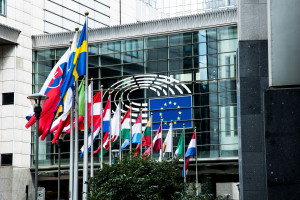The European Commission's policies can be absurd. A fierce battle for our interests in Brussels is expected.

- - We have joined the work on the new financial framework, coordinated by the Chancellery of the Prime Minister, and as the Ministry of Health, we are lobbying to secure funds in the competitiveness and defense fund for activities related to the Critical Medicines Act - said Katarzyna Piotrowska-Radziewicz, director of the Department of Drug Policy and Pharmacy at the Ministry of Health, during a meeting of the Parliamentary Group for Drug Sovereignty.
- - We are submitting our comments at the Brussels level and we will talk to other member states to gain their support and put pressure on the European Commission regarding the allocation of money in such a fund - he adds.
- Poland also submitted a request that national critical lists be taken into account when spending European funds to support production, because at present they only apply to drugs from the European list.
- "Currently, there are no incentives for entrepreneurs to relocate production from China or India to Europe. Currently, there is only a push, meaning money for production, line development, and factory expansion and modernization. The only problem later is what the company should do with the manufactured product," says the head of DPLiF.
- "The CMA doesn't have a pull incentive that would ensure the sale of an active substance. We've reported this, but the European Commission is very reluctant to do so. And this is absolutely crucial," he emphasizes.
The Polish Presidency of the EU Council ended at the end of June, but the fight for solutions that are crucial to Poland's interests and drug safety continues. The Ministry of Health is preparing for a battle in two main areas : equipping the currently toothless Critical Medicines Act with capabilities and resources, and allocating the EU budget in the financial perspective for the coming years.
This was well-received during the meeting of the Parliamentary Group on Medicine Sovereignty (September 10).
As Katarzyna Piotrowska-Radziewicz, director of the Department of Drug Policy and Pharmacy at the Ministry of Health , recalled, during the Polish Presidency, the ministry prepared a conference during which the issue of drug safety was raised in the economic and military context.
"I can honestly say that during meetings in Brussels with the European Commission, this was met with a great deal of misunderstanding. I was shocked that the Commission didn't feel what we felt as a frontline state . We openly said that drug safety is also a matter of military security and that the Commission must take a completely different approach to countries like Poland, Lithuania, Estonia, Latvia, and Finland, which are in a completely different geopolitical situation," said the director, dispensing with the diplomacy that prevailed during the Presidency.
- We also highlighted the fact that we have a good domestic pharmaceutical industry and can be a hub for smaller countries that do not have access to medicinal products and practically have no pharmaceutical industry.
During our Presidency , the Critical Medicines Act , which everyone had been waiting for, was also announced.
"Of course, everyone was happy that it was finally here and that the European Commission saw the need to support the production of active substances at a time when we, as Europe, find ourselves in a very critical situation. But does this act really meet our needs? I have many doubts," said the director.
The biggest money goes to Germany, France and Italy as the largest economiesThe list of objections the government raised in its position on the bill is long. First, money.
"The amount allocated to the implementation of CMA tasks, €800 million, is ridiculous. While it applies to the old financial perspective, this amount is small. We really wanted the CMA to have a separate fund for financing drug production. Of course, this fund should be much higher than the €800 million mentioned above," the director said.
This, in fact, contradicts Brussels' new policy, which aims to move away from subfunds and toward centralized projects, in line with the announcement of the new European Competitiveness Fund, which will consolidate more than a dozen existing instruments. It's intended to help achieve health goals, but whether it will help remains to be seen, and it may also be unfavorable for smaller countries.
"We all know that in the end, the largest projects and money go to Germany, France, and Italy, as the largest economies. That's simply how it is. Therefore, we need to protect the interests of Poland and Polish entrepreneurs," said the Department's director.
"That's why we've joined the work on the new financial framework, coordinated by the Chancellery of the Prime Minister, and as the Ministry of Health, we're lobbying to secure funding for activities related to the Critical Medicines Act in the Competitiveness and Defense Fund. We're raising our concerns in Brussels and will be speaking with other member states to gain their support and pressure the European Commission to allocate funds to such a fund," she added.
A representative of the Ministry of Development Funds and Regional Policy sees it similarly: "The future and the new financial perspective also concern us. The European Commission is somewhat inclined to centralize the next EU perspective. The competitiveness fund means that some applications will be transferred to the European competition level, which may not be good for domestic companies," said Grzegorz Orawiec, director of the Department of Innovation and Development Support Programs at the Ministry of Development Funds and Regional Policy.
Chinese medicines are still cheaperBut that's not the end of the reservations. The proposed liberalization of public procurement regulations and the exclusion of projects implemented under the MCA from general state aid rules were supposed to happen, but this did not happen.
Another issue is warehouse stocks. "This is also an important topic in the context of preparedness. Of course, drug stocks must be maintained, but it's crucial to organize them wisely, on a rotational basis. We have the example of Germany, which introduced regulations requiring six-month stocks, which led to significant problems in other markets, such as the Czech Republic, which had no source of drugs," said Director Piotrowska-Radziewicz.
- We must take into account that we are a Community market, but the regulations introduced by the Member States cannot have a negative impact on other countries, especially in terms of the availability of medicines - she stressed.
Poland has also proposed that national critical lists be taken into account when allocating European funds to support production, as they currently only apply to drugs on the European list. This means that a company can only apply for support for a drug that is on the European list. Poland can submit its own drug proposals, but to enter the EU level, the same submission must be received from at least 30 percent of countries. Therefore, our influence on this is limited.
A certain schizophrenia of the European Commission also concerns the wastewater directive - on the one hand, the EC wants to increase the production of medicines in Europe, but on the other hand, its policy is irrational when it burdens only pharmaceutical producers with the additional huge costs of combating environmental pollution.
This isn't the only example of plans and implementation diverging. "We are raising concerns about the plans for the new financial perspective and the EU budget because the current solutions are completely insufficient, overly conservative, and sometimes contradictory," said Director Orawiec.
He gave an example: "We're about to announce a call for proposals for the energy sector under the STEP program, where EU regulations list energy sources eligible for support, including nuclear energy. At the same time, the Regional Development Fund regulation excludes support for nuclear energy. We're trying to establish a relationship with the European Commission on how these two acts relate to each other."
Another issue is whether current EU-level incentives are sufficient for European producers?
According to Director Piotrowska-Radziewicz, the CMA proposal should be bolder: "Currently, there are no incentives for entrepreneurs to relocate production from China or India to Europe. Currently, there is only a push incentive, meaning money for production, line development, expansion, and modernization of factories. The only problem later is what the company should do with the manufactured product. The CMA lacks a pull incentive that would ensure the sale of the active substance. We reported this, but the European Commission is very reluctant to address it. And this is absolutely crucial."
What good is it if we move production to Europe if Chinese drugs continue to be favored due to price? This was partly the foundation of the EuroAPI project – a consortium whose ambition was to become a key and leading European supplier of approximately 200 active pharmaceutical ingredients (APIs). France announced the creation of this project in early 2021, based on six European production plants in Italy, Germany, the United Kingdom, France, and Hungary. However, in 2024, it announced the closure of two of the six factories and the cessation of production of some APIs due to the inability to compete with China on price.
Copyrighted material - reprint rules are specified in the regulations .
rynekzdrowia










